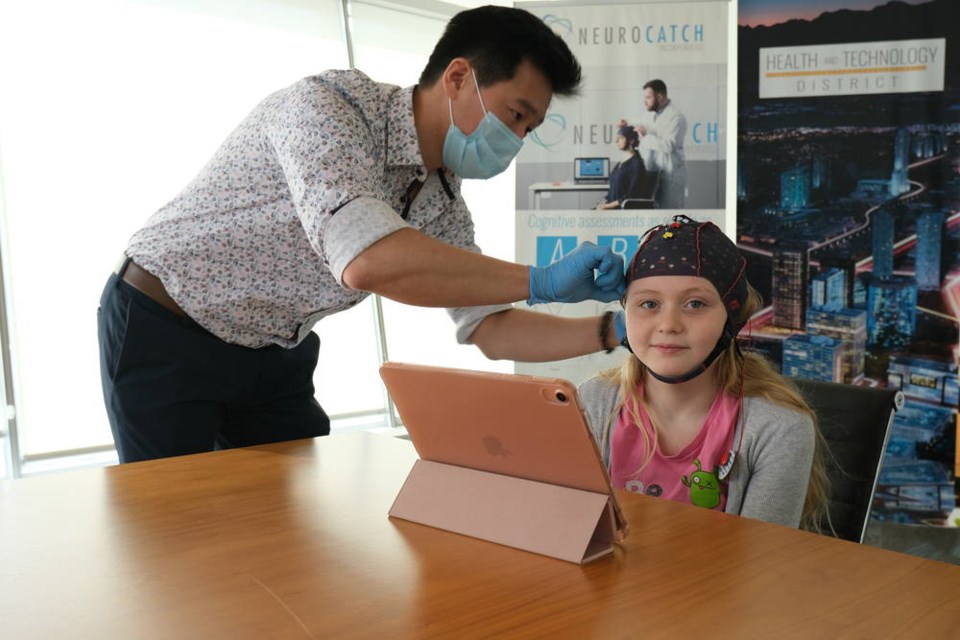Researchers at the University of Victoria have tapped into a booming gaming industry to help improve brain function and cognitive abilities in children with disabilities.
A team at UVic, building on years of study, have partnered with the private sector to create Dino Island, a video game that takes children with neurodevelopment disabilities on a tour of a fictitious, digitized island where they face a progressive series of challenges in the hopes of improving their brain function.
According to Sarah Macoun, principle investigator with the Dino Island Intervention Project, which includes Calgary’s Uncomplicated Family, Surrey’s HealthTech Connex’s Centre for Neurological Studies, and the Child Development Foundation of B.C., the game has been designed to improve attention, sustain focus and executive function — the brain activity that regulates things like a person’s inhibitions, brain flexibility and the ability to self-regulate thinking.
“We know that those abilities are universally impacted in children with all neurodevelopmental disabilities, brain injuries or chronic health problems,” said Macoun. “And if not addressed early on they can lead to secondary problems.”
Macoun said the idea is to help children with special needs reach their potential by improving and training their brain function through a fun and challenging game.
“We know if the intervention is engaging people are more likely to do it,” she said, adding if the game is interesting it can drive change faster.
Dino Island includes five “serious” video games — those that are designed for therapeutic results and not just pleasure or entertainment — that adjust themselves to the player’s success or failure in order to keep them motivated and challenged.
Macoun said it’s important the games not get too hard, as that would be frustrating, but also not too easy, as players might lose interest. So, there are gradually more difficult quests, lists of things to remember and sometimes obstacles to overcome.
“It adjusts to your performance,” she said. “They progress the way these problems progress.”
Each level completed results in a bonus round that offers players a reward — the chance to win coins to purchase things for their gaming avatar.
Macoun said it is designed to be played with a caregiver or parent in the room so the players can get out-of-game support and direction when needed to help manage frustration and improve performance.
She said the research so far suggests playing the game helps train the brain to work out problems. The hope is that will eventually translate to better brain function away from the game.
“We want them to have improved function in daily life,” she said.
Macoun said they have already seen some improvement in attention and focus in the children using the game and some have demonstrated gains in self-regulation.
“They are better able to control their emotions and their moods,” she said, adding there have been some unexpected benefits as well, with some participants showing improved performance at school. “We’ve seen some improvement in memory and being able to hold and retain information.”
Jennifer Cox, a teacher in the Surrey School District, said she has reason for optimism for the program after her daughter Addison, 12, started playing the game a couple of weeks ago.
“She seems to enjoy it and she really tries hard to concentrate,” said Cox, who noted her daughter is autistic and does tend to get easily distracted, dislikes some noises and likes to bounce around a lot. “But once she starts playing the game she really focuses and stays there.”
Cox said it’s too early to say what longer-term impact the game could have, but she believes it will eventually help Addison to focus when she is not playing the game.
“As a teacher I see that this could be used in schools for some of the kids who have trouble in school, and for parents of autistic students it could be really beneficial in helping them learn focus and providing them different ways to do that.
“There’s a lot of potential there. We are still in the early stages, but so far I have a good feeling about it.”
Dino Island, which is currently being tested by 35 families around the province, has been years in development and builds on work done by UVic researchers Catherine Mateer and Kimberly Kerns, who worked on brain plasticity to deliver cognitive improvement and remediation
Macoun noted that between seven and 14 per cent of children live with developmental disorders and cognitive challenges.
“We’ve created a treatment program that kids are willing to give the time required to make it effective, doesn’t require a clinical expert to deliver it, and can be used anywhere that an online video game can be used,” she said.
The project hopes to have another 55 families added to its early testing cohort and is looking in particular right now for volunteer families with children with autism spectrum disorder.
Macoun said they will eventually expand to include children with fetal-alcohol and attention deficit disorders.
Anyone interested in the program can check it out online at uvicdinoisland.cogtrain.ca.



